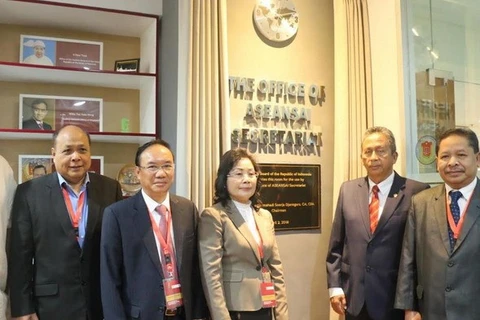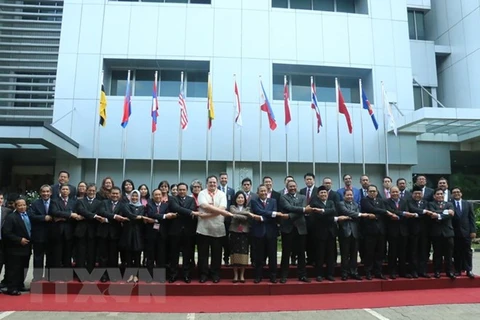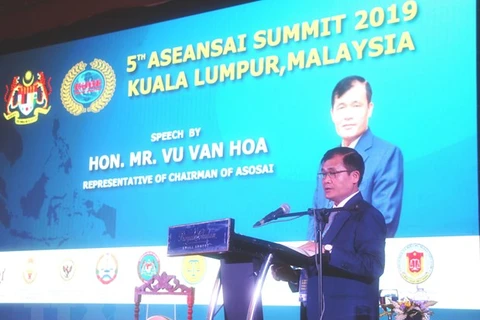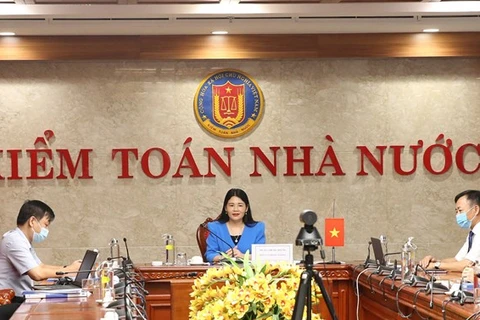 Auditor General Tran Sy Thanh (centre) and other officials of Vietnam attend the 6th ASEANSAI Summit on November 2 (Photo: Vietnamplus)
Auditor General Tran Sy Thanh (centre) and other officials of Vietnam attend the 6th ASEANSAI Summit on November 2 (Photo: Vietnamplus) Hanoi (VNA) Vietnamese State Auditor General Tran Sy Thanh attended the event as Chair of ASEANSAI's Committee for Strategic Plan and member of ASEANSAI's Knowledge Sharing Committee.
Speaking at the opening of the virtual summit, Roslan Abu Bakar, Deputy Auditor General of Malaysia, said that ASEANSAI was established 10 years ago to promote integrity in public administration and finance and enhance the capacity of ASEAN auditors.
While pointing out the challenges ASEANSAI has faced in the past time, especially financial crises, climate change, and the COVID-19 pandemic, he said that these challenges made member state audit institutions (SAIs) clearly understand the importance of cooperation in the region, as well as the importance of strengthening relationships with ASEANSAI partners in solving common problems.
To successfully realise the goals of ASEANSAI for the 2022-2025 period as well as the ASEAN Charter, he suggested that SAIs should continue to strengthen solidarity, cooperation and dialogue within ASEANSAI and outside the region to achieve common goals – law obedience and cooperation for mutual development.
As Chair of ASEANSAI's Committee for Strategic Plan, the State Audit Office of Vietnam presided over the development of the ASEANSAI Strategic Plan for 2022-2025 with the vision of becoming a reliable, dynamic and professional organisation of the supreme audit institutions to promote good governance in the ASEAN region with five core values, namely respect, professionalism, cooperation, innovation and rapid responsiveness.
SAIs have agreed to appoint the State Auditor General of Myanmar as the Chairman of ASEANSAI for the new term. They also approved the proposed budget for the organisation's activities in the 2022-2023 period.
In his inauguration speech, Myanmar State Auditor General Kan Zaw expressed his honour to assume the role of ASEANSAI Chairman for the 2021-2023 term. He said he looked forward to continuing to receive the support of member SAIs for the success of ASEANSAI in the term.
According to the State Auditor General of Malaysia, ASEANSAI's Action Plan towards 2025 was adopted by the heads of state of ASEAN member states in 2016 as a means of achieving the goal of comprehensive connectivity, thereby promoting co-operation and prosperous development among the ASEAN community. In addition, ASEANSAI has also co-operated with a number of supreme audit institutions (SAIs) of Nordic countries and development banks.
He therefore pointed out the various challenges ASEANSAI has faced over recent years, especially financial crises, climate change, and the COVID-19 pandemic. This therefore makes member SAIs better understand the importance of cooperation in the region, as well as the importance of strengthening ties with ASEANSAI partners in dealing with common problems that may arise.
Present at the 6th ASEANSAI summit were representatives from 10 Supreme Audit Institutions (SAIs) led by SAI leaders, and ASEANSAI development partners including the International Organization of Supreme Audit Institutions (INTOSAI), the World Bank (WB), the Asian Development Bank (ADB), the Norwegian State Auditor, and the Auditor Swedish State.
The 6th ASEANSAI summit consisted of three sessions including an opening session and two other sessions with 10 agendas. At the event, SAIs agreed to appoint ASEANSAI Chairman and Vice-Chairman for the new term, witnessed the ceremony of transferring the ASEANSAI Chairmanship, elected and approved Chairmen of ASEANSAI Committees for the 2022-2023 period, among others.
The ASOSAI was founded in 1979 and pursues a mission common among working groups of the International Organisations of Supreme Audit Institutions (INTOSAI), that “Professional supreme audit institutions promote good State governance”, and with the core values of “Professionalism, Cooperation, Equality, Creativity”.
Its goal is to promote mutual understanding and cooperation among member SAIs through the exchange of ideas and experience in public auditing, creating the conditions necessary for the training of State auditors to improve working quality and efficiency./.























